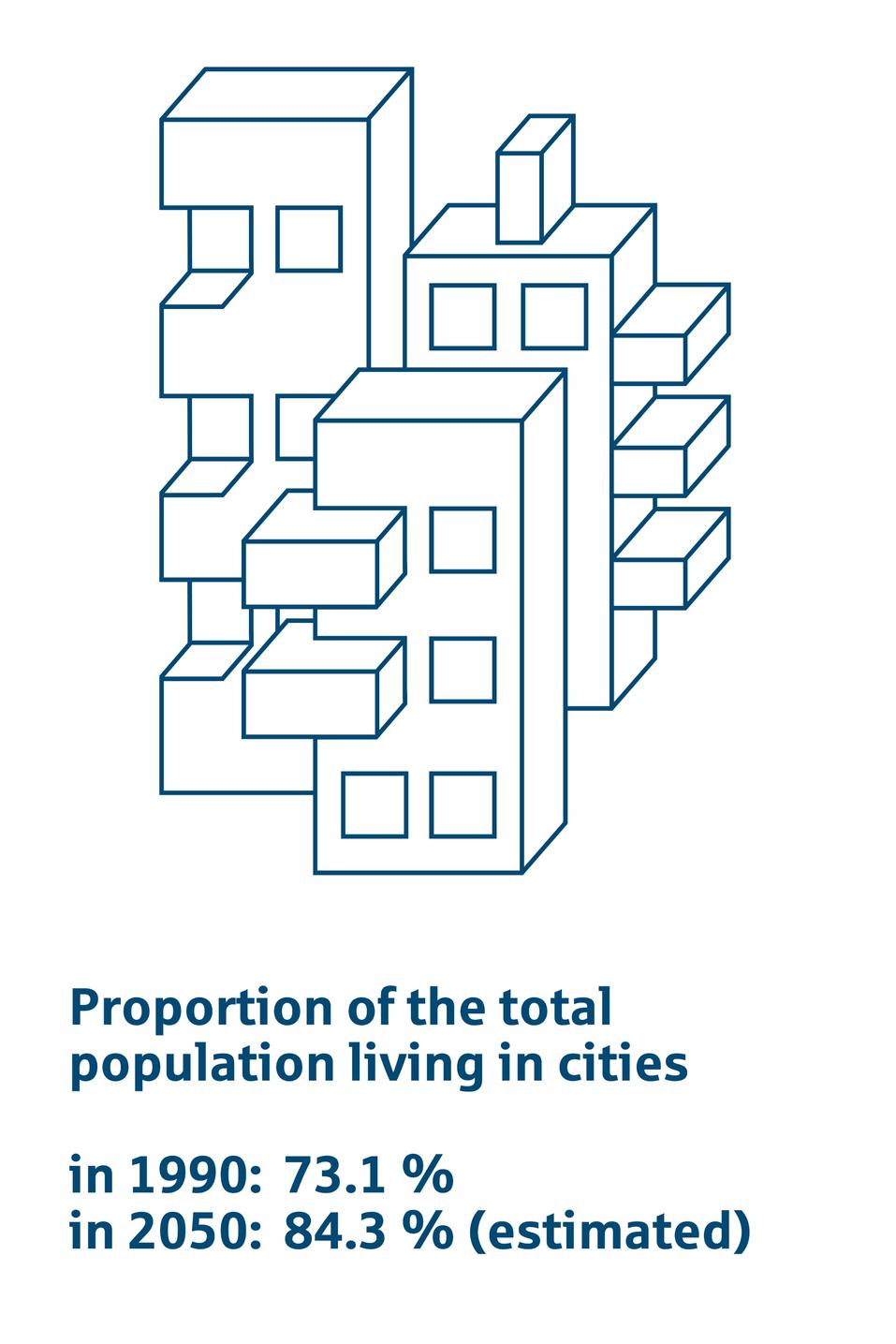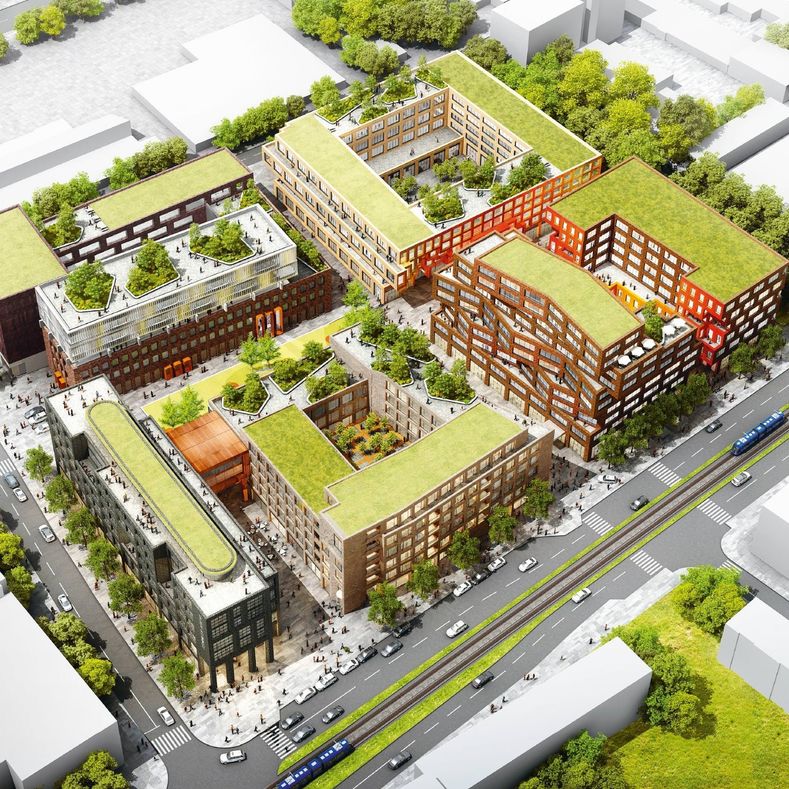Urban structures
“People are seeking urban structures, but not necessarily the city itself.”
The influx into urban areas shows no sign of abating. According to United Nations estimates, eight Germans in ten could be living in cities as early as 2030. The question is what all these people will be living in: a study produced by the Hans Böckler Foundation found that the country’s 77 major cities already have a combined deficit of an estimated 1.9 million homes. The seemingly inexorable rise in the cost of renting and buying is putting a reasonable place to live beyond the means of an ever-larger proportion of the population. This unmet demand at the same time represents a huge reservoir of untapped potential for the residential real estate sector, although the extent to which this potential can be realised is often limited by factors such as the length of time required to obtain approval for new builds.
41,4 million
number of private households in Germany in 2018
New Ideas
Helaba is actively involved in a wide range of efforts and initiatives not just to utilise the commercial opportunities harboured by urbanisation for itself but also to help ensure that people’s needs are met and that as many options as possible for urban living are developed. It has created efficient special loan funds for this purpose that make capital available for residential construction while simultaneously enabling investors to share in the returns thus generated and is also directly involved in the construction of new homes and the development of new urban ideas through its Frankfurt-based subsidiary GWH. Stefan Bürger joined the senior management team at GWH in January 2014 and has been CEO since January 2020. While he personally takes a particular interest in the urbanisation megatrend for a number of reasons, he feels that the public at large often have only a very limited grasp of what this development means.
Stefan Bürger: „Demand clearly outstrips supply in urban areas of course – and by urban areas I mean not just the big cities, but also all those other places that have the urban infrastructures required to live a city life. We need to realise that some small towns meet this criterion as well as the established metropolitan regions.“
GWH Wohnungsgesellschaft mbH Hessen
Real estate company GWH has been developing, building and managing innovative, affordable and profitable homes since 1924. A wholly owned subsidiary of Helaba, it currently has around 50,000 homes under management.
Not a linear movement
Stefan Bürger’s responsibilities at GWH include the areas of corporate strategy and real estate development, trading and management, so the matter of GWH’s response to urbanisation occupies a large proportion of his working life. What is clear right from the outset is that there are no easy answers, first and foremost because, Bürger explains, the reality of what we refer to as urbanisation is far more complex than a straightforward linear movement of people from the country to the city:
Stefan Bürger: „This not a case of there being one consistent pattern of migration from rural areas to the city. The groups of people making this move vary enormously in their background, their motivation and their objectives in life.”
Stefan Bürger, CEO, GWH Wohnungsgesellschaft Hessen mbH
Germany’s “Big 8” cities (Berlin, Hamburg, Munich, Cologne, Frankfurt, Dusseldorf, Stuttgart and Leipzig), in which these different groups often merge to the extent that it becomes difficult to pick them out, have recently been joined by numerous booming smaller cities on the periphery of the main centres. These smaller cities have become the target of clearly distinguishable groups of internal migrants.
Stefan Bürger: “The resort of Garmisch-Partenkirchen, for example, has become a popular place to move to for people in the 70 and older age bracket, while Kassel has become especially popular with young people just starting out on their career. And we still have the traditional student towns and urban concentrations of public officials to consider too.”

Options on a strategic basis
The differentiated migration Bürger describes can even be observed at the level of individual city districts, reinforcing the scale of the challenge posed by urbanisation for companies like GWH:
Stefan Bürger: "It is not a matter of simply building more homes in the cities. We need to be creating options on a strategic basis for specific peripheral cities or even specific districts of our cities. Students, for example, don’t have much need of luxury facilities, but these can be important for older sections of the population, which also require particular services such as social care.”
Stefan Bürger, CEO, GWH Wohnungsgesellschaft Hessen mbH
GWH is already building homes designed specifically with older people in mind in areas that have become popular with this demographic. Developed in close consultation with partners from the social care sector, such as the Johanniter, the new buildings have large doorways to accommodate nursing care beds and come with emergency call systems and stair lifts already installed. The Johanniter also provide the social care service for these properties, creating a single-source solution that older residents can find very valuable. The high level of demand demonstrates the attractiveness of the proposition.
Stefan Bürger: "This example, which is one of many, illustrates how more than anything, the multifaceted urbanisation trend presents a real commercial opportunity. We are ramping up our construction activities and are able to support higher rents in some cases too, but this can only work if we have something suitable and innovative for each of the different target groups. If we just blindly build and build, we will soon run out of customers for whatever generic home it is that we are building. Our objective must always be to develop successful economic models that offer people precisely the home they need at a price they can afford."
Stefan Bürger, CEO, GWH Wohnungsgesellschaft Hessen mbH

Resource-saving concepts
Urbanisation is being driven by perfectly pragmatic decisions on the part of the people involved: they want work, good schools, services and healthcare and leisure facilities and if that means moving to a new area, they move. Although they clearly want access to these urban structures, it is not at all clear that they necessarily want the city itself. Surveys investigating urban population growth indicate that families in particular would actually prefer to live in a more rural setting or on the edge of the city. The lack of affordable living space, especially in the big cities, also stems in part from a shortage of available building plots and the fact that the local planning authorities are understaffed, and it often takes too long to obtain building permits. GWH is responding to these limiting factors with a number of different approaches including concepts for increasing the density of existing properties, which has the added benefit of helping to conserve resources.
Stefan Bürger: „It is generally the case these days that cities have most success dealing with the situation when the public sector works together with the banks and residential real estate companies and when the whole process is managed with commitment and a social conscience so that homes are not just created but also maintained and so that no part of the population is excluded. Partnerships of this type are exactly what we are all about at GWH.”
Stefan Bürger, CEO, GWH Wohnungsgesellschaft Hessen mbH
Further selected stories
 Construction boom on the Vistula
Construction boom on the VistulaConstruction boom on the Vistula
The construction boom is strong in Warsaw. Helaba is financing projects changing the urban landscape and enhancing the quality of life for citizens. Brooklyn in Bavaria
Brooklyn in BavariaBrooklyn in Bavaria
How to convert an industrial district into a lively office and business quarter? The developers behind the “Macherei” project know just what it takes

